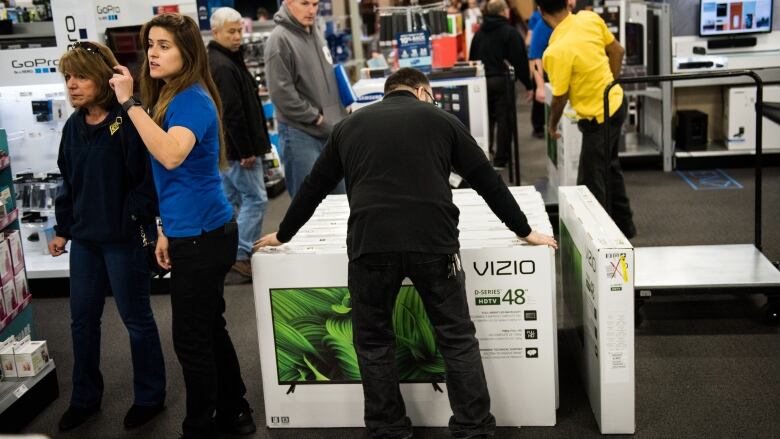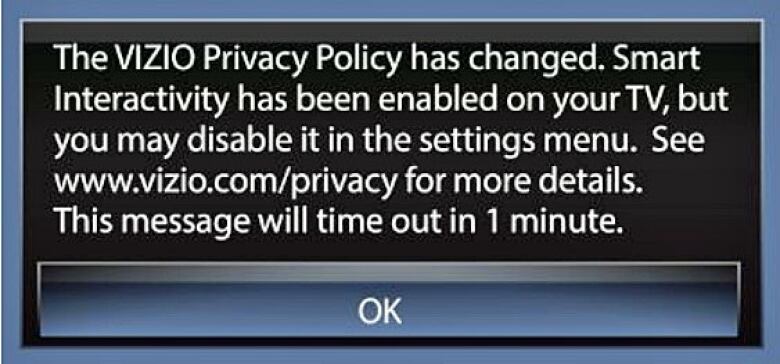Vizio TVs secretly tracked viewership in U.S. without consent
Canadian units excluded from system that set screens to report what people watched without them knowing

Smart-television maker Vizio has agreed to pay $2.2 million US to authorities to settle allegations that its televisions collected information on what 11 million viewers were watching, without their consent.
According to the settlement of a lawsuit with the U.S. Federal Trade Commission and the attorney general for New Jersey, California-based Vizio has been collecting information on viewing habits from millions of unwitting customers who have bought one of the company's smart televisions since2014.
"On a second-by-second basis," the FTC says,"Vizio collected a selection of pixels on the screen that it matched to a database of TV, movie, and commercial content."
In the industry, such information is known as "automatic content recognition" or ACR, and in a statement to CBC News, Vizio Inc. confirms that the practice is not currently used on their TVs in Canada.
"ACR is not on in Canada," Katie Kotarak, a spokesperson for the company,said.
In the U.S. however, millions of devices are involved in a system whereby customers unwittingly signed up when they opted into the company's"Smart Interactivity" program, which gives them program suggestions based on their viewing habits.

But behind the scenes, the company was cross-referencing those hundreds of billions of daily data points against cable services, set-top boxes and even DVDs for a precise picture of what those 11 million TV sets were being used for.
"All of this, the FTC and AG allege, was done without clearly telling consumers or getting their consent," FTC attorney Lesley Fair said in a blog post announcing the settlement.
The company also compiled detailed information on people who bought their TVs, including their sex, age, income, marital status, household size, education level, home ownership, and household value. Vizio then took that data and sold it to eager marketers.
According to court documents, the system helped advertisersgaugethe effectiveness of their campaigns by tracking "whether a consumer has viewed a particular television program following exposure to an online advertisement for that program."
Vizio is based in California but wasbought by Chinese conglomerate LeEco for $2 billion US last year. While not as household a name as some others in the space, market research firm NPD estimated at the time that Vizio is the No. 1 best-selling brand of smart TVs in the U.S.
No names or contact info collected
For its part, Vizio says its program never "paired viewing data with personally identifiable information such as name or contact information," but it is pleased to bring the matter to close via the settlement. "The practices challenged by the government related only to the use of viewing data in the 'aggregate' to create summary reports measuring viewing audiences or behaviours,"saidJerryHuang, a lawyer for the company.
The company will get rid of the data it collected by March 1, and, in future, ask for express permission before collecting it.
"Today, the FTC has made clear that all smart TV makers should get people's consent before collecting and sharing television viewing information and Vizio now is leading the way," saidJerry Huang, a lawyer for the company.
Vizio will pay $1.5 million US in fines to the FTC and additional civil penalities to the state of New Jersey bringing the total price tag to $2.2 million.












_(720p).jpg)


 OFFICIAL HD MUSIC VIDEO.jpg)
.jpg)



























































































